Posts by Mary Ann
Oregon Tradeswomen Grad Jess Ross Featured in Short Film!
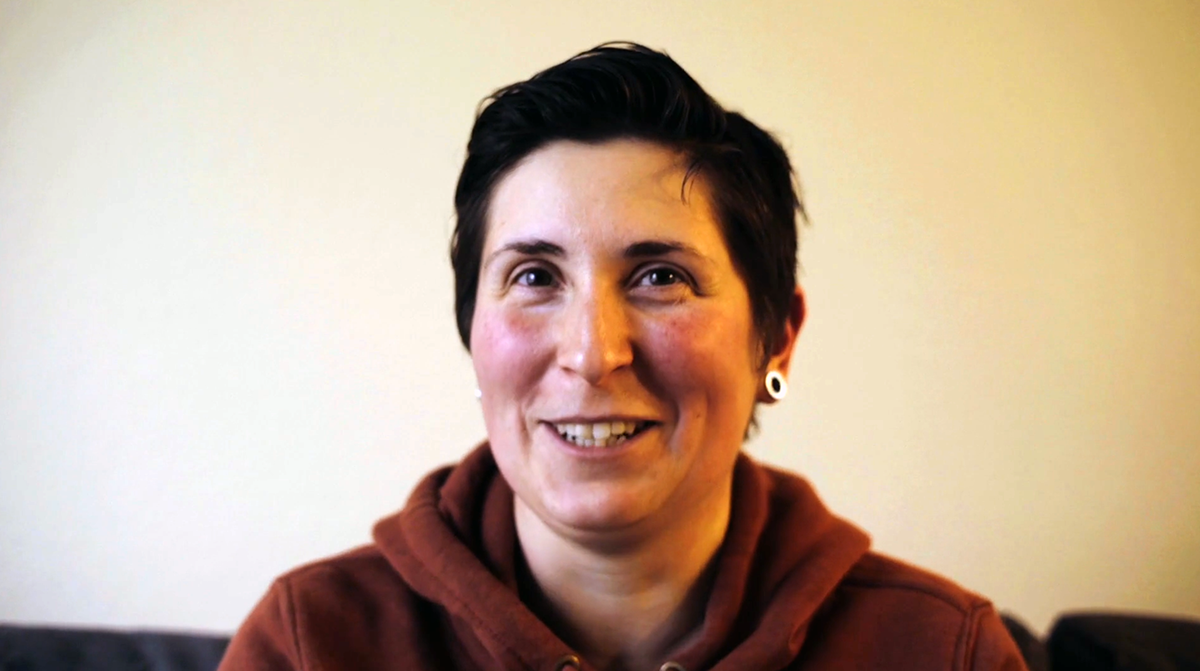 Oregon Tradeswomen Graduate and Ironworker, Jess Ross, was recently featured in a film created by Peripheral Vision, and screened at Communion: A Virtual Film Fest.
Oregon Tradeswomen Graduate and Ironworker, Jess Ross, was recently featured in a film created by Peripheral Vision, and screened at Communion: A Virtual Film Fest.
The feature with Jess follows her on her way to work as she recalls how she first became interested in Iron work, stories from the field, and what her experience has been like over her 5 year apprenticeship and journeying out.
Watch the film featuring Jess!
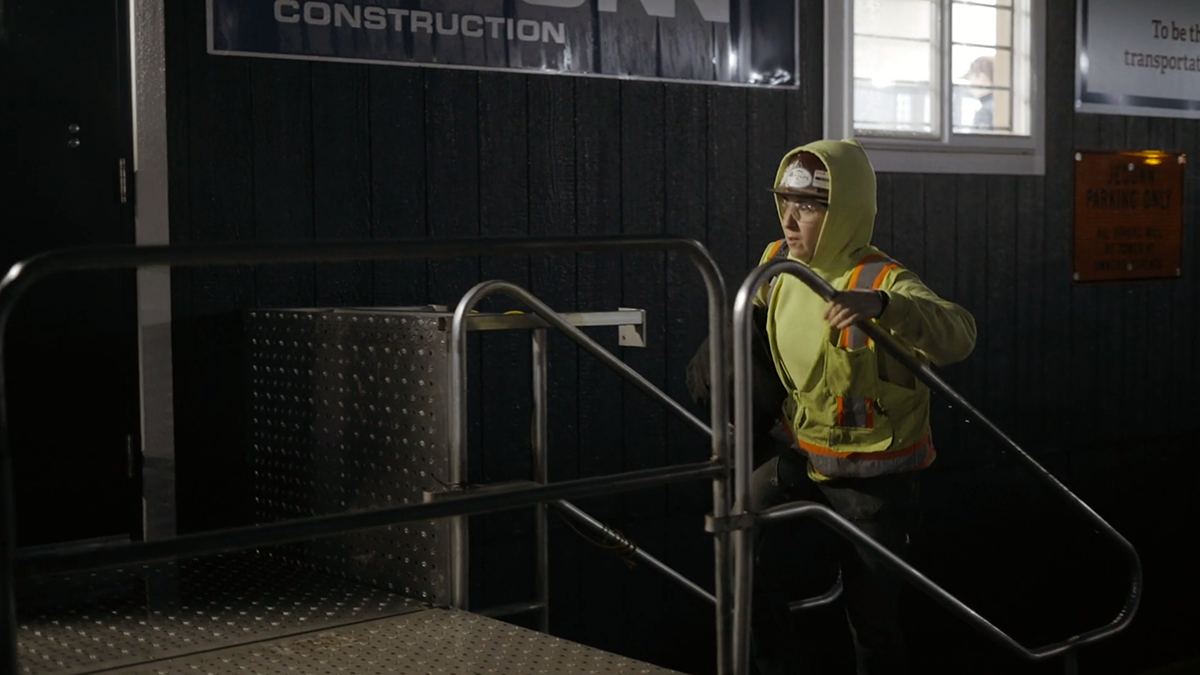
We have so much appreciation to Peripheral Vision for uplifting the voices and experiences of tradeswomen. Peripheral Vision PDX is a 501(c)3 nonprofit film production company and training organization dedicated to celebrating the vision, narratives and leadership of marginalized people.
Deena Barbera, Power Line Tree-Trimmer
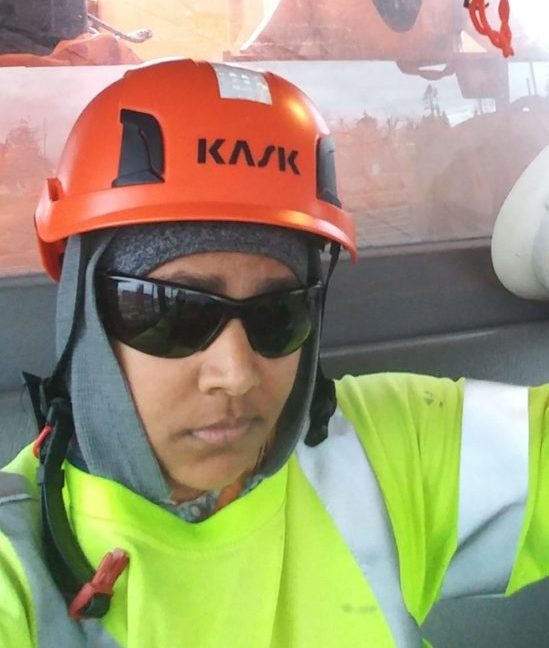
“2 weeks of work, 8 straight days of 16–17-hour days with only 4 hours of sleep between…”
This is part of a message we received from 2013 Oregon Tradeswomen Program graduate and Power Line Tree Trimmer, Deena Barbera, and we’re both proud of and exhausted for her!
With the inclement weather conditions brought on by the huge winter storm that hit Oregon in February of 2021, Deena worked tirelessly and didn’t stop until power was restored for the thousands of Oregonians who were left without electricity.
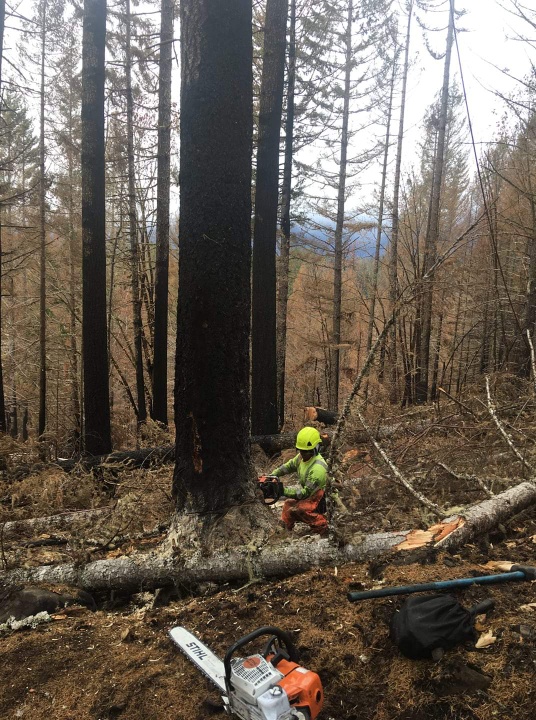
Deena and her crew of tree-trimmers are the essential workers who clear the tree debris obstructing power lines, allowing the line-workers access to power lines and restore power to communities facing record power outages. The work of a Power Line Tree Trimmer is crucial for community safety even when they aren’t busy clearing tree debris for the line-workers to restore power during an outage. When trees and tree limbs grow freely around power lines, there is a risk of electric shock or electrocution due to leaves or branches touching the lines. Other times, trees that are left to grow without maintenance and trimming have branches that grow heavy and break, taking power lines down with them.
Deena wasn’t always in the Tree Trimming trade though; before joining Oregon Tradeswomen’s Trades and Apprenticeship Career Class (TACC), she worked in retail. Despite always giving 110% and making it clear she aspired advance in her company, management only offered promises for career mobility – never delivering. Wanting to see real outcomes from her hard work, Deena decided enough was enough and came to Oregon Tradeswomen’s Annual Career Fair. From here, Deena’s eyes opened to a new world of possibility in the construction trades.
During Deena’s time as a pre-apprentice with Oregon Tradeswomen, she built her skills and gained industry knowledge. She also found community in other women like herself who want to work hard, get their hands dirty, and build a better life. Beyond that, Deena shared that “Oregon Tradeswomen’s pre-apprenticeship prepared me for what to expect in a male-dominated career.”
After graduating from TACC, Deena first started a career welding and spent 4 years in that line of work before learning about opportunities with NW Line. Intrigued by the trade, Deena went back to Oregon Tradeswomen’s Career Fair to make connections at the NW Line JATC booth and to try out the hands-on activities. With the solid foundation she built during TACC, Deena had the confidence in herself and her abilities to know that she could be successful in the line trades.
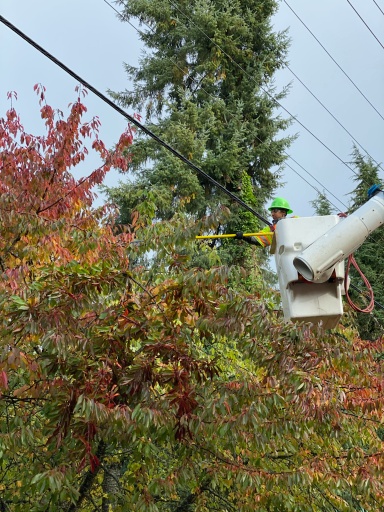
Today, Deena is thriving as a 4th Year Apprentice working for Asplundh under the NW Line JATC. When she’s not clearing tree debris during storms and power outages, she and her crew visit sites each day to trim trees within 10 feet on any power line. Some trims are short, while other jobs take hours. Those long-haul jobs are usually “burners,” a shorthand term for trees that make contact with the lines. In those cases, they use special techniques and non-conductive tools to safely clear the trees without getting electrocuted. To say the least, it takes serious skill and precision to be a tree-trimmer.
Trades workers like Deena play such a huge part in keeping our communities safe and functioning! We are so proud of Deena for her hard work, dedication, and accomplishments and are hope she and her team got a lot of much-deserved rest when their work was done doing the critical work to restore power for so many Oregonians who lost electricity during the historic winter storms of February 2021!
Water and Utility Resources from the Portland Water Bureau
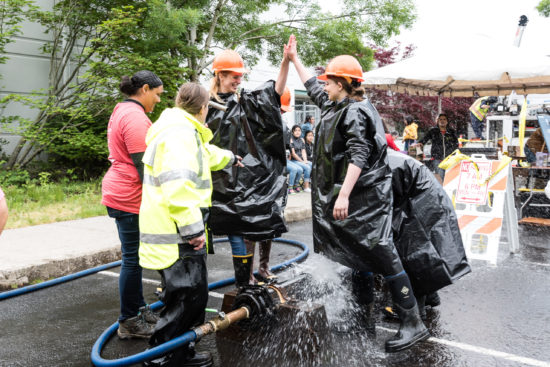
OTW May 2018 Oregon Tradeswomen’s 26th Annual Career Fair Water Bureau Activity
Oregon Tradeswomen was recently contacted by a representative at the Portland Water Bureau with some excellent resources for financial assistance to help with business, home, or apartment water and sewer bills, free water testing and conservation kits, toilet rebates, and more!
Check out some of these handy resources from the Portland Water Bureau for more information about the ways they can help you have clean, affordable drinking water in your home or business:
Financial Assistance
If customers qualify based on income, they may be eligible for a discount on their sewer/stormwater/water bill, crisis assistance and free water leak repair for homeowners and more. Attached are print versions of our application for financial assistance. The Water Bureau has an online financial assistance application as well. Contact Customer Service with questions, or help with applications.
Visit the water bureaus website for more information.
503.823.7770 x 3
PWBCustomerService@portlandoregon.gov
Water Efficiency Program
Saving water can help save on your bill! The Water Bureau has free water-saving devices that can be used in the kitchen and bathroom as well as toilet rebates for homes and apartments. Swap out your old toilet with a WaterSense-labeled one and then apply for a rebate online. They also offer technical assistance for commercial customers. If your water use is higher than expected, give them a call!
Visit the water efficiency program website or contact:
503.8234527
WBEfficiency@portlandoregon.gov
Water Quality Testing
Request a kit to test your drinking water for lead
Some apartments and homes in Portland have lead solder in the plumbing. It is recommended to have your water tested. Order one of the Portland Water Bureau’s lead test kits.
-
- Order a lead kit: 503-988-4000, Request a kit online form
- Questions about lead prevention related to water quality: 503-823-7525, Report a water quality concern online
Women’s History Month 2021
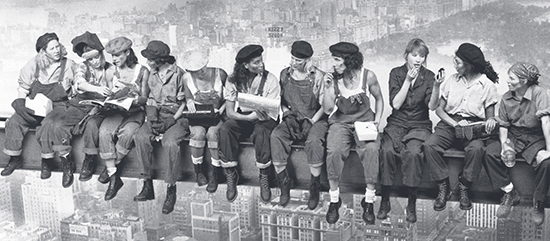
Oregon Tradeswomen celebrates and honor the many contributions of women every day, and especially during Women’s History Month and on International Women’s Day, we pause to acknowledge the trailblazing work of women and girls who have pushed to change our nation and our world for the better.
We recognize the women and girls who, despite the barriers and roadblocks of discrimination, courageously and bravely fought for, and continue to fight for:
- paid family leave and sick leave
- quality, affordable childcare
- wage equity and benefits
- eliminating gender-based violence and jobsite harassment
- and so much more.
Women and girls who, through persistence and commitment, stand strong in the demands for justice, dignity, and equality.
We celebrate and honor our sisters throughout history and those making history today – especially Black women, Indigenous women, Immigrant women, Trans women, and others from diverse communities are on the front lines of our communities working for a better world for all of us each and every day.
These inspiring, powerful, and passionate women are champions for change, including our sisters in the Tradeswomen Movement. In our recent history, these sisters who paved the way for other women and girls and continue to break the “concrete ceiling” in the construction industry, making the industry better for ALL workers.
Women like:
Portland’s own Donna Hammond, Business Representative at IBEW Local 48 who was one of the first women accepted into the IBEW/NECA apprenticeship program back in 1978 and who is a tireless champion for equity and inclusion in our industry.
Evelyn Shapiro, the first female Executive Secretary-Treasurer to lead the United Brotherhood of Carpenters regional council in the United States and who is leading diversity and equity efforts in her union.
Adrienne Bennett, the first black female master plumber in the U.S. who is now CEO of her own contracting company, Detroit-based Benkari LLC.
Judaline Cassidy, one of the first women to be accepted into Plumbers Local 371 in Staten Island, NY, and the first woman elected to the Examining Board of Plumbers Local No. 1 and founded Tools & Tiaras to inspire girls to be empowered by the trades.
Carolyn Williams, one of the first women to complete Atlanta IBEW Local 613’s apprenticeship program as a journeyman inside wireman and the local’s first woman and person of color to serve as an assistant business manager.
Vicki O’Leary, who at age 21, became an ironworker in Chicago and later went on to become the International union’s General Organizer for Safety and Diversity, where she led the effort for paid maternity leave – the first in the nation’s building trades union, and where she was instrumental in creating “Be That One Guy“, a program to fight jobsite sexual and other harassment.
Pat Williams, trailblazing feminist, and LGBT activist in blue collar trades in Southern California who was one of the first women to enter the Operating Engineers apprenticeship program in Los Angeles in 1979 and later became a District Representative and Vice President of IUOE Local 501. Pat supports the Tradeswomen Memorial Project at the Long Beach Rosie the Riveter Park and is a co-founder, along with Jamie McMillan, union ironworker of KICKASS Careers.
Sue Doro, creator, and editor of Pride and a Paycheck, the only publication dedicated to tradeswomen and the Tradeswomen Movement. Sisters like Molly Martin, Dr. Vivian Price, Dr. Lynn Shaw, and Jane Templin who created the Tradeswomen Archives Project to document and keep the history of tradeswomen’s contributions alive. Susan Eisenberg, retired IBEW member who became one of the first women in the United States to become a licensed union journey-worker electrician who, for over four decades has advanced issues of tradeswomen through such seminal works as “We’ll Call You If We Need You: Experiences of Women Working Construction”, which brought the issues of discrimination and exclusion that tradeswomen face daily in the industry.
These women, and so many others, continue to change not only our industry, but our world, for the better. Join us in applauding them, honoring them, and celebrating them.
Join us in acknowledging women’s achievements, raising awareness against bias, and taking action for equality as we continue to work together to forge a better world.
In strength and solidarity,
Kelly Kupcak

Your Support is Life-Changing
Tracy Weber: On A Path to Financial Stability and a Secure Future
Tracy graduated from Oregon Tradeswomen’s (OTW) apprenticeship readiness class in March 2020 – the first full class in our brand-new building and workshop before COVID shifted our in-person gatherings.
Since completing OTW’s class, Tracy had another baby and recently started her Carpentry Apprenticeship. We are so happy for Tracy in these next steps in pursuing a career in a trade she had always been interested in but just didn’t know how to get started. OTW is happy to be part of her success story and will be here for future support, training, and connections.
Tracy recently shared her personal story of working in customer service, becoming a mother, and wanting to provide a more stable future for her family at Worksystems’ EOP program presentation at Prosper Portland‘s Board meeting. We invite you to watch it and hear directly from Tracy how she went from working a dead end job, and smoking pot all the time, and not caring about the future, to getting serious to get the training and support needed to pursue a career as a Carpenter.
Oregon Tradeswomen is grateful to our community of supporters and donors who make it possible for strong women like Tracy to get the information, training, and support they need to build strong lives, families, and communities.
A Peek Behind the Curtain – And a Big Thank You
Bringing in the money to keep nonprofits going, year after year, is mostly like a big patchwork quilt your grandma made. It has:
- Bits of solid old fabric (funders who are with you year after year)
- Patches of new fabric (new donors) to cover the worn spots
- Yearly mending to keep the quilt from fraying as the years go by.
Those of us who work at nonprofits often ask each other about this patchwork and share stories of pain and triumph. 2020 started as a year full of hope and excitement – we moved into our beautiful new workshop and training facility in January. We set up desks for our newly expanded staff and welcomed the first group of students into the new classroom where we expected to serve more women and do it more effectively than ever before. On track to offer classes in the evenings and on weekends, we had finally removed one of the historic barriers preventing more women from taking advantage of this free, life changing resource.
As the year wore on, it felt like the rug was pulled out from under our feet with COVID health and safety restrictions forcing us to cancel classes and our oh-so-beloved annual Career Fair.
But then the light started to shine through the window and help started to show up in many different forms:
- We’re grateful to the Foundation Partners who called to say that our grant funding could be used to simply get through the year.
- Long time industry partners, hearing about lost funding, said – “how can we help?” – then they dug deep and doubled or tripled their “normal” investment.
- A ten year old named Earlie, who saves her money all year to help local nonprofits, sent in a gift of $25 (Thank you Earlie!)
- When we needed extra tools to set up the training workshop in a COVID-safe way, and I couldn’t reach my local contacts, the leadership team at Milwaukee Tools simply said “Don’t worry, we’ll take care of you”
- When we needed extra lumber and supplies to re-start training, Parr Lumber and Platt Electric donated everything on our wish list.
- A woman I’ve never met knocked on the front door, told me she had known about our work for some time and thought we might need some help. She sat and wrote us a check saying, “Use it wherever you need it most”.
- In the first two weeks of the Willamette Week Give!Guide, half of all the donors have made their first gift to the organization.
We’re grateful for every person, for every dollar and for every kind word that has helped us get through this year – including Laura, who sent in $10 and said “I’m unemployed right now, I wish this was more”.
To every single person who has invested in our work and the mission of OTW, and who’s helping us put women to work, giving them and their families a secure future – YOU will forever be part of our well loved patchwork quilt.
Thank you,

Lisa Palermo
Development Director
Construction Careers Education and Career Pathways Navigation Program
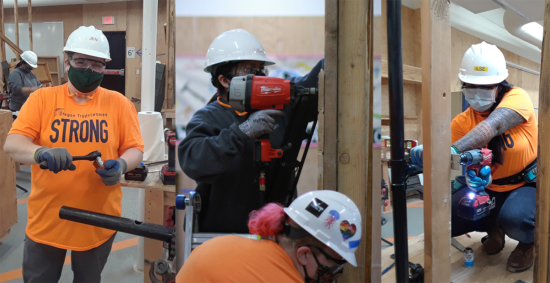
Like many nonprofits during this tumultuous year, Oregon Tradeswomen was challenged to shift our training, programming, and services in this time of social distancing due to COVID while still meeting the needs of our community, our industry, and the many women looking to start careers in the skilled construction trades.
Our team turned the challenge into an opportunity to build something bigger, and better, and our updated program and service offerings in 2021 means more women will have access to our training and expanded resources and support, including:
- Women outside the Portland Metropolitan region
- Women in rural communities
- Women living on Tribal Lands
- Women serving as caretakers during COVID restrictions
- And many others
In 2021, Oregon Tradeswomen will launch our re-envisioned Construction Careers Education Sessions and will provide additional information, resources, and support to women seeking to enter the skilled construction trades.
We will offer monthly webinars where jobseekers can learn about the many exciting and dynamic opportunities in the skilled trades, learn how to navigate the nuances of registered apprenticeship, the construction industry, and navigate a successful career in the industry.
Whether someone needs more skills, has some experience and needs help putting together a trades resume and preparing for an interview, or needs a bit more support before starting an apprenticeship-readiness program, our Construction Careers Education and Career Pathways Navigation Program team will be there to help.
Stay tuned for a schedule of events coming in January 2021! We look forward to putting more women to work!
Labor Day Message from Oregon Tradeswomen’s Executive Director
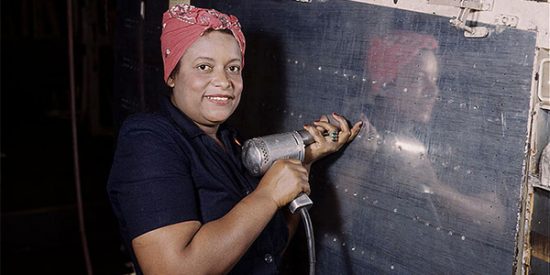
Original photo by Alfred T. Palmer – Image credit to United States Library of Congress
The first Labor Day in the United States was celebrated in 1882, almost two decades before women had the right to vote and before the U.S. Department of Labor recognized the contributions of women to the Labor Movement by creating the Women’s Bureau. Nevertheless, women contributed to the Labor Movement before it was even called a movement.
Women like:
Mary Harris “Mother” Jones, who was once called the “most dangerous woman in America”, fought to protect child workers and push for enforcement of child labor laws. She became an organizer for the United Mine Workers and stood up to big companies and organized coal miners to demand better conditions for workers.
Velma Hopkins, an African-American organizer with Local 22 of the Food, Tobacco, Agricultural, and Allied Workers of America-CIO. She mobilized 10,000 workers in North Carolina to unionize R.J. Reynolds Tobacco Company.
Dolores Clara Fernández Huerta, a labor leader and civil rights activist who, with Cesar Chavez, co-founded the National Farmworkers Association, which later became the United Farm Workers. She was tireless in her fight for worker rights, immigrant rights, and women’s rights.
Frances Perkins who, having personally witnessed workers jump to their death during the Triangle Shirtwaist fire, helped to pass strong labor laws after becoming the first woman appointed to the U.S. Cabinet as Secretary of Labor in 1933.
Ai-Jen Poo who worked to organize domestic workers in 2000, and was key in the passage of the Domestic Workers Bill of Rights in New York. The bill legitimated domestic workers and gave them the same lawful rights as other employees, such as vacation time, and overtime pay.
Hattie Canty, the legendary African-American unionist was one of the greatest strike leaders in U.S. history. After her husband died, she raised eight children on her own and dedicated her life to improving the working conditions of others. She fought for a living wage and for the engagement of People of Color in the Labor movement. Her patient leadership helped knit together a labor union made up of members from 84 different nations!
The women noted here are just a few of the very many who made sacrifices for worker’s rights.
As we mark the 100th anniversary of the creation of the U.S. Women’s Bureau, Oregon Tradeswomen would like to honor them, and all who have fought and continue to fight for our nation’s workforce.
Oregon Tradeswomen is grateful for our partners in the Labor Movement, here in Oregon and across the country who work tirelessly for worker’s rights, dignity, and justice. We are with you in the fight today, and always, as today we honor our nation’s workers!

Kelly Kupcak, Executive Director
Oregon Tradeswomen
Construction Safety Task Force Shares Free Online Resources to Help Protect Against COVID-19
Seeking to increase job safety awareness and to help protect workers against the COVID-19 pandemic, a joint task force has published free resources for the construction industry. The resources provided by the COVID-19 Joint Construction Safety Task Force include a safety checklist, best practices, and photographs.
Best practices:
http://www.oregonbuildingtrades.com/covid-19-safety-best-practices/
Safety photographs:
http://www.oregonbuildingtrades.com/covid-19-safety-photographs/
From April 15 through May 7, groups of five to seven task force members, assisted by an Oregon OSHA consultant, visited nine job sites in Portland, Hillsboro, Lake Oswego, Salem, Eugene, Oregon City, and sites in Eastern and Central Oregon to assess job safety practices addressing COVID-19 and to make recommendations for improvements.
The task force is a partnership of union and non-union industry professionals, with support from Oregon OSHA. The group meets twice a week to monitor health information and government guidelines, and to collect data and information. It will continue to coordinate job site visits as long as Oregon Gov. Kate Brown’s “Stay Home, Save Lives” executive order is in place.
“The construction community recognizes the need to work together across all areas of development to protect our workers, the public, and visitors to our job sites,” said Mark Long, CEO of Oregon Home Builders Association. “It is gratifying to be part of a group of industry professionals committed to bending the curve of the COVID virus while contributing to Oregon’s economy.”
“We depend on the skilled pipe-fitters and plumbers working for Charter on our project sites and fab shops,” said Cordell Tietz, president of Charter Mechanical. “It is critical that we have a safe environment for our employees, so they can continue to take care of our customers’ needs. This crisis has presented new challenges to all of us, and it’s been important and rewarding seeing our industry come together to keep people working safely and completing critical projects.”
Task force members:
- Associated General Contractors-Oregon Columbia Chapter
- Central Oregon Building and Construction Trades Council
- Columbia-Pacific Building and Construction Trades Council
- Hoffman Construction Company
- Lane, Coos, Curry, Douglas Building & Construction Trades Council
- NECA-IBEW Electrical Training Center
- O’Neill Construction Group
- Oregon Home Builders Association
- Oregon OSHA
- Oregon State Building and Construction Trades Council
- Oregon Tradeswomen
- Pacific NW Regional Council of Carpenters
- Pendleton Building Trades Council
- Plumbing and Mechanical Contractors Association
- Salem Building and Construction Trades Council
- Southern Oregon Building and Construction Trades Council
- University of Oregon Labor Education and Research Center, LERC
- Worksystems
For general questions about the construction task force, contact Mary Ann Naylor at Oregon Tradeswomen, maryann@tradeswomen.net
Task force contacts:
Robert Camarillo, executive secretary, Oregon State Building Trades Council: robert@oregonbuildingtrades.com
Mike Salsgiver, executive director, Associated General Contractors – Oregon Columbia Chapter: mikes@agc-oregon.org
Mark Long, chief executive officer, Oregon Home Builders Association:
mark@oregonhba.com
Paul Philpott, political representative, Pacific NW Regional Council of Carpenters:
pphilpott@nwcarpenters.org
Mary Ann Naylor, communications & marketing director, Oregon Tradeswomen: maryann@oregontradeswomen.net
Aaron Corvin, public information officer, Oregon OSHA:
aron.corvin@oregon.gov
Construction Task Force: COVID-19

TASK FORCE LAUNCHED TO ASSESS AND SHARE CONSTRUCTION JOB SAFETY PRACTICES IN RESPONSE TO COVID-19
[PORTLAND, OREGON, April 24, 2020] — Aiming to increase job safety awareness in response to the COVID-19 pandemic, the Oregon State Building Trades Council has launched a task force to help construction contractors follow current guidelines and protect workers while continuing to do business.
The COVID-19 Joint Construction Safety Task Force – encompassing representatives from the building trades unions, industry partners, management, and employer representatives– has been meeting online three times a week and scheduling visits to various construction sites in Oregon.
A group of five to seven task force members, assisted by Oregon OSHA consultants, are visiting sites to assess the effectiveness of job safety practices intended to address COVID-19 and to make recommendations for improvements. All task force members and Oregon OSHA consultants will practice social distancing while visiting construction job sites. At the same time, the task force – an advisory group – is monitoring the most current health information and government guidelines, and collecting data and information about best jobsite practices. This data and information will be shared with construction contractors and workers.
“The safety of the people who are out there working on construction sites is our highest priority,” said Robert Camarillo, executive secretary for the Oregon State Building Trades Council. “With this task force, our goal is to improve job safety and increase educational resources during an incredibly challenging time.”
Oregon Gov. Kate Brown’s “Stay Home, Save Lives” executive order – issued in response to the coronavirus outbreak – does not include construction among the businesses that must close.
The COVID-19 Joint Construction Safety Task Force is a partnership of union and non-union industry professionals, with support from Oregon OSHA. Its membership includes:
- Associated General Contractors-Oregon Columbia Chapter
- Central Oregon Building and Construction Trades Council
- Columbia-Pacific Building and Construction Trades Council
- Hoffman Construction Company
- Lane, Coos, Curry, Douglas Building & Construction Trades Council
- O’Neill Electrical Construction
- Oregon Home Builders Association
- Oregon OSHA
- Oregon State Building and Construction Trades Council
- Oregon Tradeswomen
- Pacific NW Regional Council of Carpenters
- Pendleton Building and Construction Trades Council
- Plumbing and Mechanical Contractors Association
- Salem Building and Construction Trades Council
- Southern Oregon Building and Construction Trades Council
- University of Oregon Labor Education and Resource Center, LERC
- Worksystems
Download a .pdf of the press release
For questions about the construction task force, contact:
Mary Ann Naylor, communications director
Oregon Tradeswomen
maryann@tradeswomen.net
Individual Contacts:
Robert Camarillo, executive secretary
Oregon State Building Trades Council
robert@oregonbuildingtrades.com
Mike Salsgiver, executive director
Associated General Contractors – Oregon Columbia Chapter
mikes@agc-oregon.org
Matt Swanson, political coordinator
Pacific NW Regional Council of Carpenters
mswanson@nwcarpenters.org
Mark Long, chief executive officer
Oregon Home Builders Association
mark@oregonhba.com
Aaron Corvin, public information officer
Oregon OSHA
aaron.corvin@oregon.gov
